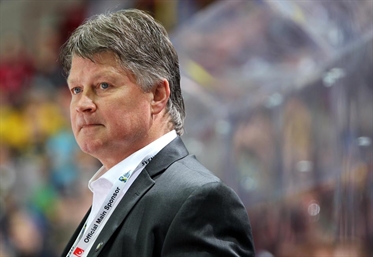Løvdal’s big challenge
Løvdal’s big challenge
Norway’s coach talks World Juniors, Olympics, and more

 MALMO, SWEDEN - DECEMBER 29: Norway head coach Orjan Lovdal looks on from the bench during preliminary round action against Sweden at the 2014 IIHF World Junior Championship. (Photo by Andre Ringuette/HHOF-IIHF Images)
MALMO, SWEDEN - DECEMBER 29: Norway head coach Orjan Lovdal looks on from the bench during preliminary round action against Sweden at the 2014 IIHF World Junior Championship. (Photo by Andre Ringuette/HHOF-IIHF Images)
Under head coach Ørjan Løvdal, the newly promoted Norwegian U20 squad has suffered three straight losses to Russia, Finland, and Sweden, getting outscored 26-1.
Løvdal, a three-time Olympian as a forward from 1984 to 1992, must get his troops inspired before their Monday outing against Switzerland, which is likewise winless in Group B. The 51-year-old’s résumé also includes winning the Gullpucken award as the Norwegian Player of the Year in 1986 and 1987 and playing at the 1995 IIHF World Championship.
IIHF.com caught up with Løvdal after the 10-0 loss to the host Swedes at the Malmö Arena.
How did you feel about your team’s performance against Sweden?
It was a very tough game for us. They controlled the first period with three goals. We worked hard. The players wanted to play tough, but the Swedish team was much faster and stronger.
What are the biggest difficulties that a team like yours faces when moving up from Division I to the elite division?
I think the main difference is that we have maybe 30 players to take at this level. They have maybe 200. That’s a big difference.
Despite the tough losses, are there things that your team is doing that you like?
Our young players are working very hard. We have two players born in 1996 [forwards Ludvig Hoff and Martin Rønnild]. They’ve both played well at this level.
What did you think of the way Markus Søberg, your only NHL draftee, played in his return from injury?
It was his first game in a while, and he played well, I think. He skated hard and he worked hard from the start.
What do you think of the way the city of Malmö has hosted this tournament so far?
It’s very nice. Tonight the arena had 11,000 people in attendance. Nobody on our team has played in front of so many people before. It’s new for us.
You’ve been working with Norway’s U20 and U18 programs since 1999. What are the biggest areas of progress you’ve seen in that time?
The most important thing is that we’ve been able to get people into other leagues: Sweden, Canada. We are not so many. There’s a big difference if you’re playing at home. The U20 league has too big of a difference between the best players and the other players.
What’s needed most to develop the junior game within Norway itself?
More rinks and more players.
What was your playing career like?
I started playing when I was five years old in Oslo with a club called SK Forward. I played there till I was 17 and then I went to Sweden and spent a season with Almtuna. I had two seasons with Hammarby in Stockholm and then headed back to Norway. I played until 1997.
Who were your favourite players?
When I was a junior, Gretzky was big. I also liked Guy Lafleur of the Montreal Canadiens and Sweden’s Börje Salming.
You played in the 1979 IIHF World Junior Championship, the first one ever held in Sweden. What are your memories?
I remember a game against Czechoslovakia. The Stastny brothers were playing. We had a 4-4 tie after two periods. We lost 6-4. It was a good game.
What stands out to you from your three Olympic experiences in Sarajevo, Calgary, and Albertville?
In Yugoslavia, it was a new thing for me. It was big for us and I was a young kid. And being together with all the other athletes was nice. Calgary was the best one. I got to meet all the stars from the other countries. We saw Katarina Witt and many of the great hockey players. I only played a couple of games in Albertville and then went home.
How do you think Norway will do in Sochi?
Hopefully they do well. I think the national team has been doing well for five or six years.
Do you talk to national team head coach Roy Johansen a lot?
All the time. We’re in the same program, so we talk a lot. He’s here with us.
Finally, what do you expect in your next game against the Swiss?
The Swiss team is better for us. We have more of a chance to do well there. The most important games for us will be against Germany in the last two or three games. We’re working to be better every day, and hopefully we’re in our best shape when we meet Germany.
Back to Overview































































